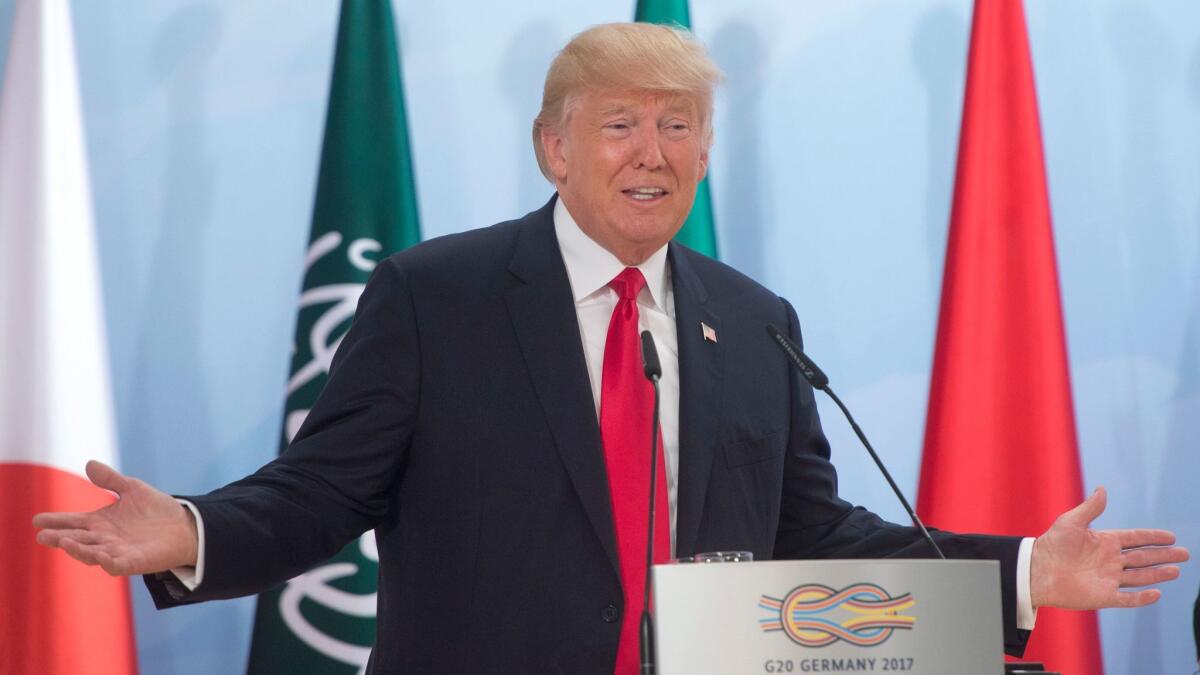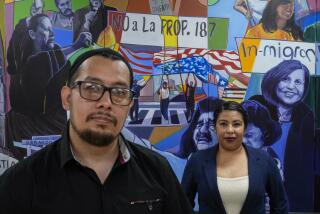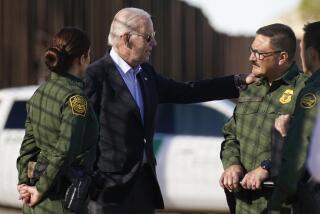Trump administration delays program that lets immigrant entrepreneurs into the U.S.

Reporting from San Francisco â The United States is pulling back the welcome mat for foreign entrepreneurs.
In a move that drew criticism from the technology industry, the Trump administration delayed the rollout of the International Entrepreneur Rule, a piece of immigration policy set to take effect July 17 that would have granted entry for 30 months to foreigners seeking to build and grow their businesses in the U.S.
For the record:
8:46 a.m. Nov. 27, 2024An earlier version of this story misstated that the International Entrepreneur Rule offered a visa. The rule offers entrepreneurs temporary entry to the U.S.
The Department of Homeland Security decision, announced Monday, delays implementation of the rule until March 14, 2018. But the department said it also plans to open the matter to public comment and potentially rescind the program entirely.
The decision is a blow to the U.S. technology industry, which has long relied on foreign talent to fill its ranks, and has for decades attracted founders from around the world. Research from the National Foundation for American Policy found that more than half of the countryâs start-ups valued at more than $1 billion had at least one immigrant founder.
But it also shows that tech leaders â despite having a seat at President Trumpâs table â do not necessarily have the presidentâs ear.
Top tech leaders such as Amazonâs Jeff Bezos, Appleâs Tim Cook and Microsoftâs Satya Nadella convened with the president in December, shortly before his inauguration, and again in June to discuss matters such as cybersecurity and immigration. But the group of leaders appears to have had little effect in swaying the president, who has maintained a hard-line isolationist stance on immigration policies.
âTodayâs announcement is extremely disappointing and represents a fundamental misunderstanding of the critical role immigrant entrepreneurs play in growing the next generation of American companies,â said Bobby Franklin, president and chief executive of the National Venture Capital Assn. âAt a time when countries around the world are doing all they can to attract and retain talented individuals to come to their shores to build and grow innovative companies, the Trump administration is signaling its intent to do the exact opposite.â
The rule, signed by President Obama in his final days in office, was largely viewed as uncontroversial, according to immigration attorneys, because it had a relatively high barrier to entry. To qualify, entrepreneurs had to show that theyâd raised $250,000 or more from established American investors, or $100,000 or more in grants from government entities.
The International Entrepreneur Rule differs from the popular H-1B visa, a program for skilled foreign workers that requires employer sponsorship.
The tech industry and venture capitalists in particular had considered the rule a boon given the cap on H-1B visas and the difficulties and long wait times for green cards.
The Department of Homeland Security said its decision to delay the program was due to limited available resources.
âItâs an unfortunate thing, because there are no real winners in this implementation,â said Sam Adair, a partner at immigration law firm Graham Adair. âItâs bad for the economy, itâs certainly bad for job creation, and it is definitely stifling to innovation.â
Ayda Akalin, an immigration attorney at the Aghnami Law Corp., said the delay has caused anxiety for some clients, who were waiting for the rule to take effect so they could launch new businesses in the U.S.
âMaybe he is trying to build off the âhire Americanâ speech he gave,â Akalin said of Trump. âIn reality, it doesnât really make sense, because these people are going to be creating jobs, and theyâre funded start-ups. This goes contrary to the policy of creating American jobs.â
There are optimists in the tech industry, though, who believe that a lot of the presidentâs anti-immigration rhetoric is just noise, and that the current administrationâs rules have yet to stifle innovation in the country.
But even noise can be problematic, as Vineet Jain, the co-founder and chief executive of Silicon Valley start-up Egnyte, learned on a recent a trip to India.
âThere was this one guy who had come from one of the best schools in New Delhi, and he was starting his own business, and he said, âMan, Iâm not going to the U.S., they make it so much harder for you these days,ââ Jain said.
âItâs not in line with reality, itâs all perception. But whatâs very real is people are no longer feeling welcome.â
Twitter: @traceylien
Twitter: @jflem94
Lien reported from San Francisco and Flemming from Los Angeles.
ALSO
Stocks have a listless day; Snap drops nearly 9%
Wells Fargoâs $142-million sham accounts settlement: What you need to know
Bankrupt owner of Titanic artifacts seeks buyer, and director James Cameron may come to the rescue
If you drive a Ford, Nissan or Mazda, your air bag might be dangerous







